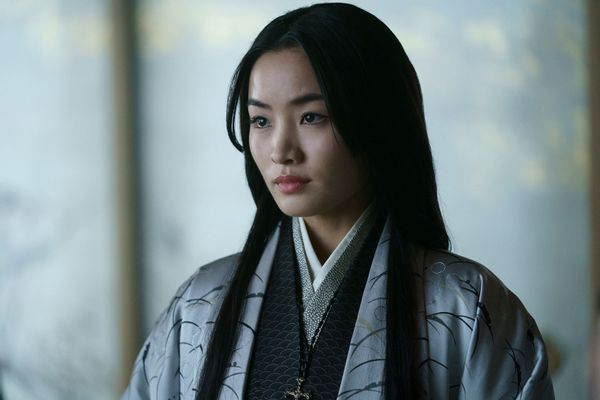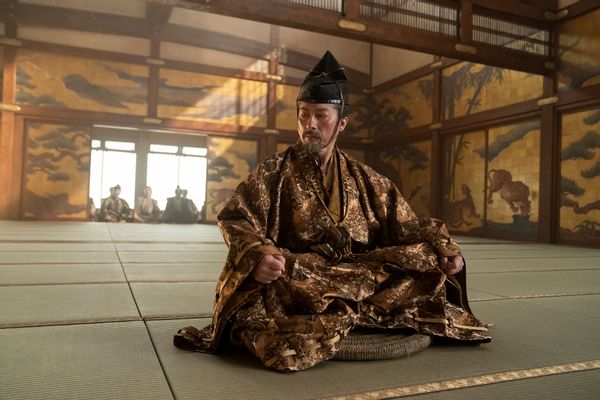
By the conclusion of FX’s “Shōgun,” we won't be talking about Cosmo Jarvis. He takes second billing to Hiroyuki Sanada, which is proper. It becomes apparent that Jarvis’ character, John Blackthorne, is designed to be overwhelmed by the forces surrounding him. From feudal Japan’s landscape and its politics, to the purposeful ferocity of Lord Toranaga and his vassals, to the etiquette intricacies he fails to grasp and the cost of his clumsy words, Blackthorne nearly drowns in all of it.
In the end, Blackthorne comes to understand that he can only pray to be towed by Sanada’s Lord Toranaga, who generates a gravitational pull in a constellation of indelible characters and mighty performances. Foremost among them, aside from Sanada, is Anna Sawai as Mariko, a haunted noblewoman and Christian convert whom Toranaga assigns to Blackthorne as his interpreter and minder.
Sawai plays the lead in the Apple TV+ series “Monarch: Legacy of Monsters” and other roles foregrounding her action capabilities, none of which capitalize on her ability to manipulate silence with remarkable eloquence. Her face is a minimalist canvas through which all things translate plainly, making the rare appearance of a tear that much more piercing.
Sanada, a producer on “Shōgun,” is known to American film and TV audiences from co-starring roles in slick action movies like “John Wick 4” and sci-fi series such as “Lost” and “Westworld.” One imagines we'll see him in more projects after this, but it’s Sawai whose Mariko sets our minds whirling as a pair of characters stare at a portentous sunset, pondering everything that has transpired over the 10 hours leading up to this moment.
The shadow Toranaga and Mariko cast makes Blackthorne a footnote. Blessedly, we understand why that is — and Jarvis probably does, too.

Much of the plot remains as novelist James Clavell wrote it, with John Blackthorne and his dying crew washing up on the shore of Izu in the year 1,600, when the nation’s only relationship with Europe was through Portugal and its Catholic emissaries.
Toranaga’s daimyo Kashigi Yabushige (Tadanobu Asano) and his nephew Omi (Hiroto Kanai) are the first to encounter these filthy Englishmen, of whom Blackthorne is the only one who speaks Portuguese. The series’ handling of subtitles is one of its neater crafting choices, in that it trusts us to understand that while we hear characters speaking English to each other, most of the time they're actually communicating in Portuguese, as that is the only European language Toranaga's people would have encountered.
In context, it drives home the point that the communication that matters most is in Japanese, translated for the audience by way of the text onscreen.
Blackthorne’s mission is to establish a foothold in the “Japans” on behalf of the queen, but Toranaga is focused on trying to survive the machinations of his political rivals. The nation’s recently deceased ruler left governing power in the hands of his appointed Council of Regents, including Toranaga, a military hero and one of the king’s most trusted allies.
But the other regents, swayed by the politically cunning Ishido (Takehiro Hira), view Toranaga as a threat and scheme to eliminate him. Against these concerns, Blackthorne’s rivalry with the Portuguese is meaningless; besides, to him, Yabushige and the rest, Blackthorne, who they refer to as merely “Anjin,” or pilot, is a barbarian whose only value to them is his boat.
Calling limited series "events" tends to be a misnomer these days, implying a distinction from typical episodic entertainment that is rarely borne out as consistently across all creative realms as it is here. “Shōgun” is a true epic, which says something in this age of dragon fantasies. Positively likening this production to “Game of Thrones” should be a relief to series creators Justin Marks and Rachel Kondo, who evidently strove to strike a balance between care and fearlessness without restricting the story’s breathing room.
You can see the work poured not only into “Shōgun's” construction but also its execution. Most of us can't specifically recognize the pains taken to ensure that the actors’ elocution is period-appropriate, each piece of cloth from their costume hangs perfectly or their hair is not only in place but also the right length to convey their station.
All this merges into an immersive topography that, unlike the Eurocentric novel or NBC’s adaptation, feels natural and familiar.

But it’s Richard Chamberlain and his striding across Japan’s landscape people recall ever so vaguely — this was 44 years ago after all — a position that launched him as that decade’s king of made-for-broadcast TV romances in the U.S.
Back then, Japan’s contribution to popular culture was nowhere as prevalent as it is today, facilitated in no small way by the expanded availability of travel and other developments shortening the distance between nations and their people’s history.
Remaking “Shōgun” necessitates that the script rearranges around the gravitational forces at this story’s center: Toranaga, Mariko and other vassals. One sacrifice resulting from this approach is the plausibility of Mariko’s eventual attraction to Blackthorne, who is basically a lost pooch.
This is less of a commentary on Jarvis' talent than the result of being surrounded by potent personalities to whom Blackthorne must defer. Meanwhile, it also brings a sharper focus to Asano’s infusion of the slightest humor into Yabushige’s treachery and the attentive performances of ensemble players, such as Moeka Hoshi, whose character Fuji rises out of a wrenching tragedy, and Tokuma Nishioka, whose Hiromatsu serves as Toranaga’s heart and conscience in moments where he appears to abandon both.
“Shōgun” doesn’t soft-pedal the bloody reality of this feudal era; in the opening episodes, men die in several horrific ways, though seppuku, a suicide ritual that involves opening one’s belly with a blade before being beheaded, recurs throughout its 10 episodes.
For all its brutality, the series retains the original’s romance without sliding into its predecessor’s cultural fetishism. Quite the opposite: It may inspire a yearning to learn more about this history.
Even if it doesn’t, you may find yourself contemplating how easily we can be seduced by compelling stories about people who do terrible things to achieve noble outcomes and how little most of us matter to their ends. Only great storytelling can achieve this feat. The rest take it for granted that they can refer to themselves as events and we'll believe them.
"Shogun" premieres with two episodes Tuesday, Feb. 27 on Hulu and airs at 10 p.m. Tuesdays on FX.







